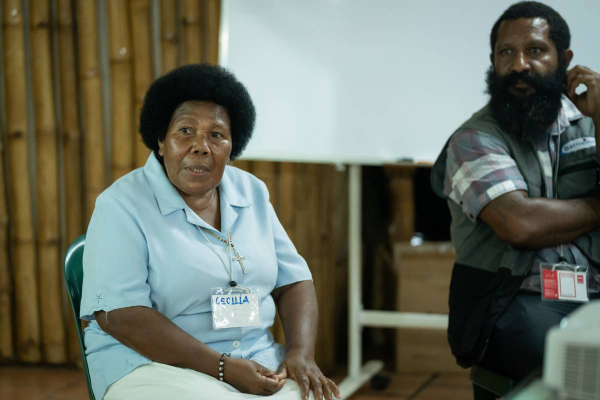Look Beyond: A Call to Worship

The thirstiest I’ve ever been was on the back of a horse named Hard Rock. Seldom one to turn down an adventure, I agreed to go trail riding with friends without considering that my lack of riding experience might be a problem. The horse I rode was well-named — massive and stubbornly opposed to moving — and it wasn’t long before I fell far enough behind that my friends were out of sight.
Under the blazing Carolina summer sun with no idea how to steer a horse, I suddenly realized I was thirsty. Not just a little thirsty. The kind of thirsty that made my hands shake and head spin. Water consumed my thoughts, and I looked desperately around the open field for any sign of a well or creek. The only bit of water was a small mud puddle in the middle of the trail. It took a huge amount of willpower and a mental recitation of all the microorganisms the puddle might contain to keep myself from slipping off Hard Rock and dropping to my knees to drink.
Thirst is a craving like few others.
Intense Longing
David knew thirst. As a shepherd in the arid wilderness, he understood the value of water and was familiar with the desperate feeling of dehydration.
In Psalm 63:1, David used the imagery of thirst to express a different kind of intense longing: “O God, you are my God; I earnestly search for you. My soul thirsts for you; my whole body longs for you in this parched and weary land where there is no water” (NLT).
What made David ache to stand in God’s presence? The answer comes in the next two verses: “I have seen you in your sanctuary and gazed upon your power and glory. Your unfailing love is better than life itself; how I praise you!” (v. 2-3)
David had seen God’s power, glory and love, and nothing less than that could satisfy him.
I knew I needed to ride past that muddy puddle because there was a bottle of clean water waiting in my car. And David knew he needed to look beyond what he could see to a better reality — one that inspired him to worship.


There is More
People are made to worship, to be caught up and drawn in by something. And in this world we’re surrounded by beauty that captivates and inspires. Hazy mountain peaks that catch and throw the setting sun. Tiny sparks dancing their dizzy way into the night. Ocean waves rolling out to kiss the sky. Baby laughter. The scent of sun-warmed evergreens. Music that swells at just the right moment. The smile on a beloved face. These are lovely things that can make us ache for more.
And there is more.
Every gift and flicker of beauty is a dimmed reflection of the Creator himself. James 1:17 reminds us of this: “Whatever is good and perfect is a gift coming down to us from God our Father, who created all the lights in the heavens. He never changes or casts a shifting shadow” (NLT).
Our longing for the beautiful things God created is actually a symptom of the true longing within us: a longing for God himself.

Past the Present
God invites us to look beyond the present — past all the beautiful things he’s created and circumstances we experience — to the reality of his unchanging goodness.
God’s steady, faithful kindness exists outside of what we can see. Our feelings and circumstances don’t change who he is. If our focus is on him, we can worship him no matter what’s happening in or around us.
Paul and Silas understood this and set a dramatic example of looking beyond their circumstances and responding with worship. Their bold preaching and miracles in the name of Jesus created such an uproar in the city of Philippi that a mob formed, demanding their arrest: “They were severely beaten, and then they were thrown into prison. The jailer was ordered to make sure they didn’t escape. So the jailer put them into the inner dungeon and clamped their feet in the stocks” (Acts 16:23-24, NLT).
Paul and Silas reacted to the injustice in an unexpected way — and the outcome was equally unexpected: “Around midnight Paul and Silas were praying and singing hymns to God, and the other prisoners were listening. Suddenly, there was a massive earthquake, and the prison was shaken to its foundations. All the doors immediately flew open, and the chains of every prisoner fell off!” (Acts 16:25-26, NLT)
Paul and Silas worshiped a God who was beyond their circumstances, and it resulted in their freedom. While we may not often see such immediate results, when we choose to focus on God and proclaim who he is, worship always leads us toward freedom.
From Captive to Captivated

Like Paul and Silas, David had many people who wished to harm him. He spent years running from King Saul and faced violent betrayal from some of his closest confidants. It would’ve been easy for David to grow despondent during these times; instead he wrote songs about God’s faithfulness. As he worshiped, David reminded himself of the truth:
“Though a mighty army surrounds me, my heart will not be afraid. Even if I am attacked, I will remain confident. The one thing I ask of the LORD — the thing I seek most — is to live in the house of the LORD all the days of my life, delighting in the LORD’s perfections and meditating in his Temple. For he will conceal me there when troubles come; he will hide me in his sanctuary. He will place me out of reach on a high rock. Then I will hold my head high above my enemies who surround me. At his sanctuary I will offer sacrifices with shouts of joy, singing and praising the LORD with music” (Psalm 27:3-6, NLT).
David knew he was held by an eternal God — that he was safe in God’s presence. That allowed him to be freed from fear of his circumstances. Worship moved David’s heart beyond suffering and into freedom.
We may not be hunted by physical enemies like David or imprisoned like Paul and Silas but, like them, we can move from captivity to being captivated by God. He longs to set us above the reach of the things that seek to destroy us — above our anxiety, grief, sin, addictions, illness and heartache — as we remind our own souls of his unchanging character. God’s power dwarfs our problems when we worship him.
Drink Him In
Worship might look like raised hands and harmonies on a Sunday morning. Sometimes it might look like a walk through quiet woods, a conversation over coffee about what God is teaching you, a wild dance party in your kitchen or the creation of something that reflects God’s beauty.

Worship can be woven from color and light, laughter and silence, texture, flavor and story. It can roll hot down your cheeks as tears of hard obedience, lay you on your face in surrender and raise you to your feet to take the next step forward.
Worship declares that our narrative doesn’t end here on earth — that past everything we see is a God who alone can satisfy our deepest thirst. Worship lifts our gaze above lovely things to the radiant glory brighter than anything we’ve known.
God calls his children to worship because when we look beyond our circumstances to him, we understand we’ve barely begun to drink in the depths of his power and love. When we worship, we end up craving more of him.
And we will be filled.
Pause and Look Beyond
Take some time to look beyond your circumstances and worship God as you reflect on the following:
What do I tend to turn to in order to satisfy my spiritual thirst? What might it look like to awaken a craving for more of God instead?
How can I move from being captive to my situation to being captivated by God?
Finally, read Psalm 19, Psalm 65, Psalm 104 or another Scripture passage that reminds you of God’s beauty, power, glory and love. Speaking words of truth and worship can change the way you think!
God is doing amazing things around the world, and you can be a part of seeing people encounter Him through Scripture in a language and format they clearly understand. Join the work by praying with us!






